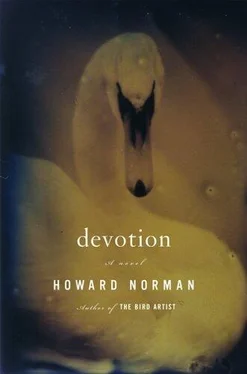Their second night together began with heightened anticipation based somewhat on the first. Then they abandoned themselves to even more subtle, and not so subtle, exploration; sometimes in a fugue state of amorous devotion you cannot help what you say; at about 2:30 A.M., David said, “I love your body” (a person might say anything, often something, when memory isolates it from its original context, embarrassing), the most complete sentence possible between breaths. At some other point, Maggie slid herself on top of David and, inside a moan, said, “This feels nice.” Then they heard a thud against the wall. They fairly froze; Maggie started laughing; they hung on to each other as if for dear life. David said hoarsely, “Was that a body, do you think?” Maggie’s laughter, deep as it was, made things physically a bit awkward, even difficult for David to breathe, the way she lay spent across his chest, her mouth at his ear, her breath softly ratcheting down to normal, almost. Yet they hadn’t in the slightest moved apart.
“I believe it was Miss Brockman’s cello case,” she said.
“Her cello case?”
“She had, or decided she’d had, a bad performance this evening. Haydn’s Concerto for Cello and Orchestra in D Major, arranged for the more intimate ensemble. She’ll wreck her room. I’ll have to smooth things over with management. She’ll wreck her room like the Rolling Stones, except all on her own and a bit more demurely. She writes things out on the mirrors in lipstick. Some amazing phrases over the years; she’s quite the pornographer. When she gets really worked up. Maid service gets some interesting reading when Miss Brockman’s in town and doesn’t play well.”
David barely began to slip from Maggie; she held him still; David was grateful for this; they’d wait for the next thing to happen. “Do you suppose her cello was in the case?” he said.
“Oh, lord, no. No, no, no. You see, after the concert, I caught a certain familiar look on her face. I told our stage manager, Alistair, to provide the cello safe conduct. He got the empty case back to Miss Brockman’s room. Obviously she discovered it empty. That might’ve set her off.”
“And the cello itself is where?”
“Upright in my closet, right here in room 334.”
“You know these musicians very well, don’t you?”
“Quirky natures, many of them. They each have their superstitions and such, which I find interesting. Onstage they like to be observed. Offstage they can be terribly private, some of them. Miss Brockman’s alone a lot, I think. Sometimes I’m her mommy. Sometimes I’m her shrink. Mostly I just get her to the concert on time.”
“Okay, three’s a crowd. Enough about Miss Brockman.”
They turned sideways, facing each other, continued toward a blissful circumstance impossible to resolve by thought; then Maggie said, “At breakfast I had the right to ask about a wife.”
“There isn’t any wife.”
“Because if there is, I’m going to smash Miss Brockman’s cello over your head. Because it’s covered by insurance. I’ll do as much damage as possible.”
They listened. Miss Brockman had gone quiet, but Maggie said, “Just wait.” Soon they did hear Miss Brockman’s muffled voice on the telephone. She alternated sobbing with shouting, silence in between, all of which, had they fully taken it in, might’ve been a sobering human drama, but they concentrated away from it until it was altogether lost. They fell asleep briefly, waking when the telephone rang on Maggie’s side of the bed. “It’s her,” Maggie said. Five more rings, then the sound of the phone being slammed down. They heard, “Goddammit, Margaret, don’t answer, then! What do I care?” They both moved to the left side of the bed; the sheets were cooler there. They slept again.
“I read a little of your book,” David said. It was 7:30 in the morning. He’d already gone out and brought back coffee and cranberry scones. Propping herself against pillows, sheet and blanket pulled up to her neck, Maggie took a sip of coffee, rubbed her front teeth with her forefinger, drank more coffee, took a bite of scone. “Toss me a T-shirt, there, will you?” she said, conscious of having stopped short of adding “darling.” David handed her a blue oversize T-shirt, which Maggie slipped on. “This scone is delicious,” she said. “Thank you. A very nice way to wake up. I can think of only one better way, but it’s too late for that, isn’t it?”
David sat in the overstuffed chair. Setting the tray aside, Maggie got out of bed, stepped into the bathroom, shutting the door behind her. In a few moments David heard the toilet flush, the sink faucet turned on and off. Maggie emerged, walked in a comically bent-over fashion, holding the T-shirt stretched down to her thighs, and got back into bed. She took another bite of scone. “So, you read a little Anatole France,” she said. The Crime of Sylvestre Bonnard was on the bedside table.
“Twenty or so pages is all. Both nights we’ve spent together, I just opened the book to whatever page and started reading.”
“In school, didn’t they teach you to start with the first page?”
“Do you remember ‘City of Books’?”
Maggie interrupted with an impressive show of memory: “‘…thereafter made me feel very grateful to Mademoiselle Préfère, who succeeded at last in winning her right to occupy a special corner in the City of Books.’”
“How did you do that?”
“I can recite the odd passage from Proust, too. Some Stendhal. Some Victor Hugo. Maybe five Baudelaire poems in all. But for some reason — maybe I’m a freak of nature — with Anatole France it’s like I have a photographic memory. I can’t explain it.”
“From what you told me, you read him at university till you were blue in the face. I didn’t attend university, by the way. Probably you should know that.”
“Now I know it. I went to McGill. Junior year in Paris, Collège de France, on an exchange program.”
“Why do you read Anatole France in English, then?”
“I speak French pretty well. My reading skills got crummy, and I’m too lazy to work on them. I took half my courses in French. I minored in economics. I guess I thought the combination was ‘sophisticated and European,’ or something like that. But as it turned out, when I graduated, it was the economics that was useful right away. I got a job working in the business office at Dalhousie.”
“How long have you been publicity director, then?”
“Five years. I applied the second I saw the job opening. Want the rest of my résumé, David, our second morning together? First of all, observe this hair. You must have noticed I braid it. Almost every day I braid it. That’s from childhood. It’s obsessive, but it makes me feel organized. I definitely get edgy now and then — you haven’t seen this yet. Especially with people who complain about their lives. I cannot stand that. Want to see my nasty dismissive grimace?” Without waiting for an answer, she demonstrated it. Outwardly, it made David laugh; inwardly he hoped and prayed she’d never mean it for him. “I’m too thin, so say some people, my father included. I consider myself homely with a few nice features. My hands have received compliments. My feet have not.” Taking this all in, David knew she must’ve realized by now he found her beautiful. “I’m five feet nine. My nose got broken twice. Ages eight and fourteen, both while ice skating.”
They stayed in the room until 8:45. David went to his flat, showered, changed clothes and picked Maggie up in front of the hotel at 10. John Franco placed her suitcase in the back seat of David’s rattletrap Citroën, which he’d purchased from his landlord; it needed repairs but they could wait. Maggie said, “I’ve got a cup of coffee here for you”—then she said it—“darling.”
Читать дальше












